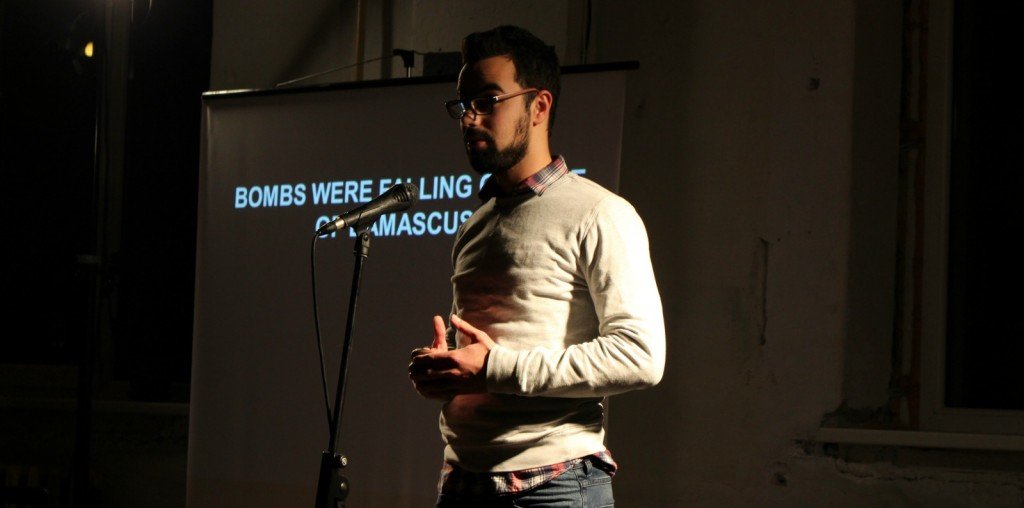As part of the My!Europe project Danish Cultural Institute in Estonia, Latvia and Lithuania hosted a debate on the role of the artists in the ongoing discussion on immigration and refugees.
How can artists and creative minds contribute to the discussion on the refugee and immigration crisis? Should the artists and creative minds contribute to the discussion on the refugee and immigration crisis?
These question fostered quite a lively debate, when the Danish Cultural Institute in Estonia, Latvia and Lithuania – as a part of the My!Europe project – hosted a debate for the creative minds and others interested in discussing the issue of immigration in Europe and the Baltics from the artists’ perspective.
The debate was set up between:
Christian Have, a Danish expert on branding and storytelling,
Henrik Hartmann, one of the leading lights in Danish theater, and a person who works with documentary theater all over the world including Latvia,
Ivars Drulle, Latvian sculptor and cartoonist, and
Andris Gauja, film director behind the internationally famous documentary ”Family Instinct”.
Zane Peneze, journalist, was the moderator of the event.
Especially the question on the artists role and his or her duty to take part in current debates in the society, divided the waters. Here the different cultural and historical backgrounds of the participants did prove to form different opinions, and make for an interesting debate. There were very different ideas on the question, if the artist ‘should’ take a standpoint on current issues and if they ‘can’ do it.
You can watch the debate in its full length here . This debate was only a conversation starter, and we hope to get the conversation going in anticipation of the main event, which is the conference on Migration 10-11 December at Latvia’s National Library in Riga. Watch, reflect and discuss!
In the light of the current refugee and asylum crisis, the issue of European solidarity is more relevant than ever
By Niels Skibsted, Danish Cultural Institute in Riga
While the EU is experiencing the largest refugee crisis since World War II and a growing pressure on the Union’s external borders, the EU struggles internally with the suspension of the Schengen Agreement, closed borders and a general lack of solidarity actions to meet this massive challenge for the European identity and unity.
A response to the refugee crisis in large parts of the population of Europe – including Denmark and the three Baltic states – has been to look inwards and protect national interests and sovereignty in fear of the consequences of the large number of refugees who these days cross EU borders. As a consequence, few have dared to lead the way for an open debate about common European solutions. Instead, the debate has been dominated by a general skepticism.
There are few places where the debate has been as intense as in the Baltic States. The decision of the governments of Estonia, Latvia and Lithuania in the summer of 2015 to allow asylum to a limited number of refugees sparked protests and a massive public opposition and a political crisis in Latvia.
14 per cent workforce
Migration in the Baltic States is a double-edged sword. While immigration is currently causing a stir, the emigration from the Baltics has been a major problem in the last decades. After the collapse of the Soviet Union, and after joining the European Union, the three Baltic States have experienced a marked decline in population, where young workers primarily went to Western Europe – a large part also to Denmark.
The consequence has been marked demographic and economic challenges. Latvia, as an example, has a little over a decade lost 14 per cent of its total workforce.
Migration is thus a two-sided problem which requires a common solution across national borders in Europe. The Danish Cultural Institute in Estonia, Latvia and Lithuania, will focus on these common European issues and the long-term solutions, with a starting point in Danish and Baltic experience, through debate, international cooperation and dialogue based upon exchange of understandings and ideas.
Events
Specifically, this is done through a series of events where the main focus will be a two-day My!Europe conference with broad participation of the Baltic, Danish and other European political players, institutions, NGOs, academics, students and generally interested.
Throughout the conference and other events the participants will initiate a constructive discussion and exchange of views on how to tackle common challenges linked to an inclusive and democratic EU and Europe. The key word here is to create a sustained and broad discussion in our region about the EU.
That is why the conference does not stand alone. There will be a pre-event, which focuses on the creative approach to discuss immigration, with the participation of Baltic cultural opinion leaders and Christian Garden and Henrik Hartmann from Denmark – whether culture has a role, and if so, what can / must it do.
Additionally, an outreach event will be held which, with a different form of dialogue, seeks to reach out in particular to the younger audience. We also work concurrently with information and networking campaigns on social media.
Interested parties will be able to follow and read about the project on websites and social media, participate in the dialogue virtually, attend the pre-events, be inspired and give an input to the debate, which all culminates in the two days of conference and creative events.
The conversation does not stop there. The conference is one of eight conferences in the My!Europe project by the Danish Cultural Institute in Estonia, Latvia and Lithuania together with the International Sonnenberg Organisation’s partners.
The many conferences together with several other parallel and related events should contribute to international and sustained conversation about how we ensure an inclusive and democratic EU with engaged citizens who take part in the debate and are instrumental in shaping a future Europe with focus on refugees and migration.
Translation of article: Ulla Sallaway
Read more about My!Europe

